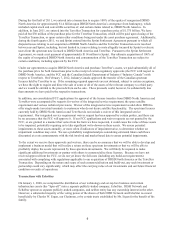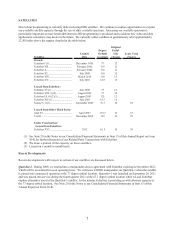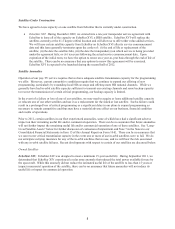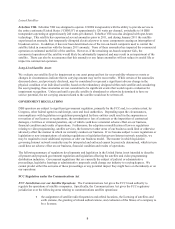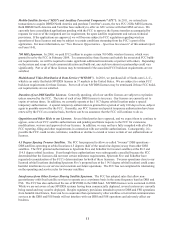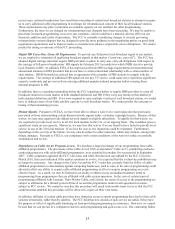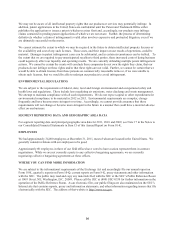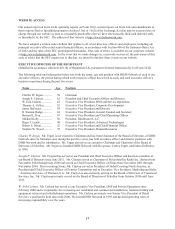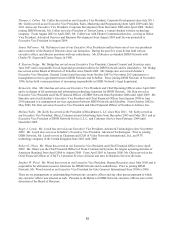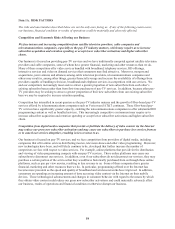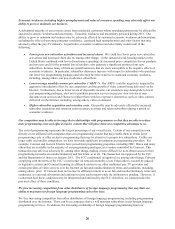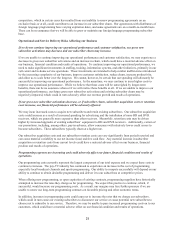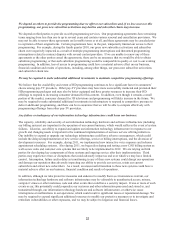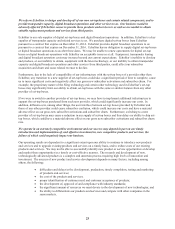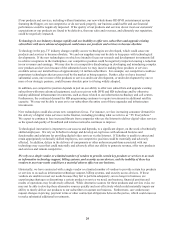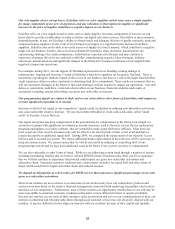Dish Network 2011 Annual Report Download - page 25
Download and view the complete annual report
Please find page 25 of the 2011 Dish Network annual report below. You can navigate through the pages in the report by either clicking on the pages listed below, or by using the keyword search tool below to find specific information within the annual report.15
15
all of the assets of the relevant company to a third party and we would be entitled to the proceeds from such a sale.
These proceeds could, however, be substantially less than amounts we have paid in the respective transactions.
In addition, our consolidated FCC applications for approval of the license transfers from DBSD North America and
TerreStar were accompanied by requests for waiver of the integrated service requirement, the spare satellite
requirement and various technical provisions. Waiver of the integrated service requirement would allow DISH to
offer single-mode terrestrial terminals to customers who do not desire satellite functionality. The spectrum licenses
currently held by DBSD North America and TerreStar do not include a waiver of this integrated service
requirement. Our integrated service requirement waiver request has been opposed by certain parties, and there can
be no assurance that the FCC will approve it. If our FCC applications and waiver requests are not granted by the
FCC, or are granted in a manner that varies from the form we have requested, it could cause the value of these assets
to be impaired, potentially requiring us to take significant write-downs on these assets. We assess potential
impairments to these assets annually, or more often if indicators of impairment arise, to determine whether an
impairment condition may exist. We use a probability weighted analysis considering estimated future cash flows
discounted at a rate commensurate with the risk involved and market based data to assess potential impairments.
To the extent we receive these approvals and waivers, there can be no assurance that we will be able to develop and
implement a business model that will realize a return on these spectrum investments or that we will be able to
profitably deploy the assets represented by these spectrum investments. We will likely be required to make
significant additional investments or partner with others to commercialize these licenses. Because we have not
received approval from the FCC, we do not yet know the full costs (including any build-out requirements)
associated with complying with regulations applicable to our acquisition of DBSD North America or the TerreStar
Transaction. Depending on the nature and scope of such commercialization and build-out, any such investment or
partnership could vary significantly, which may affect the carrying value of our investments and our future financial
condition or results of operations.
The International Telecommunication Union
Our pay-TV service also must conform to the ITU broadcasting satellite service plan for Region 2 (which includes
the United States). If any of our operations are not consistent with this plan, the ITU will only provide authorization
on a non-interference basis pending successful modification of the plan or the agreement of all affected
administrations to the non-conforming operations. Certain of our DBS satellites are not presently entitled to any
interference protection from other satellites that are in conformance with the plan. Accordingly, unless and until the
ITU modifies its broadcasting satellite service plan to include the technical parameters of DBS applicants’ non-
conforming operations, our non-conforming satellites, along with those of other DBS operators, must not cause
harmful electrical interference with other assignments that are in conformance with the plan.
Export Control Regulation
The delivery of satellites and related technical information for purposes of launch by foreign launch service
providers is subject to strict export control and prior approval requirements. We are required to obtain import and
export licenses from the United States government to receive and deliver certain components of direct-to-home
satellite television systems. In addition, the delivery of satellites and the supply of certain related ground control
equipment, technical services and data, and satellite communication/control services to destinations outside the
United States are subject to export control and prior approval requirements from the United States government
(including prohibitions on the sharing of certain satellite-related goods and services with China).
PATENTS AND OTHER INTELLECTUAL PROPERTY
Many entities, including some of our competitors, have or may in the future obtain patents and other intellectual
property rights that cover or affect products or services that we offer. In general, if a court determines that one or
more of our products or services infringe intellectual property rights held by others, we may be required to cease
developing or marketing those products or services, to obtain licenses from the holders of the intellectual property
rights at a material cost, or to redesign those products or services in such a way as to avoid infringing any patent
claims. If those intellectual property rights are held by a competitor, we may be unable to obtain the intellectual
property rights at any price, which could adversely affect our competitive position.



